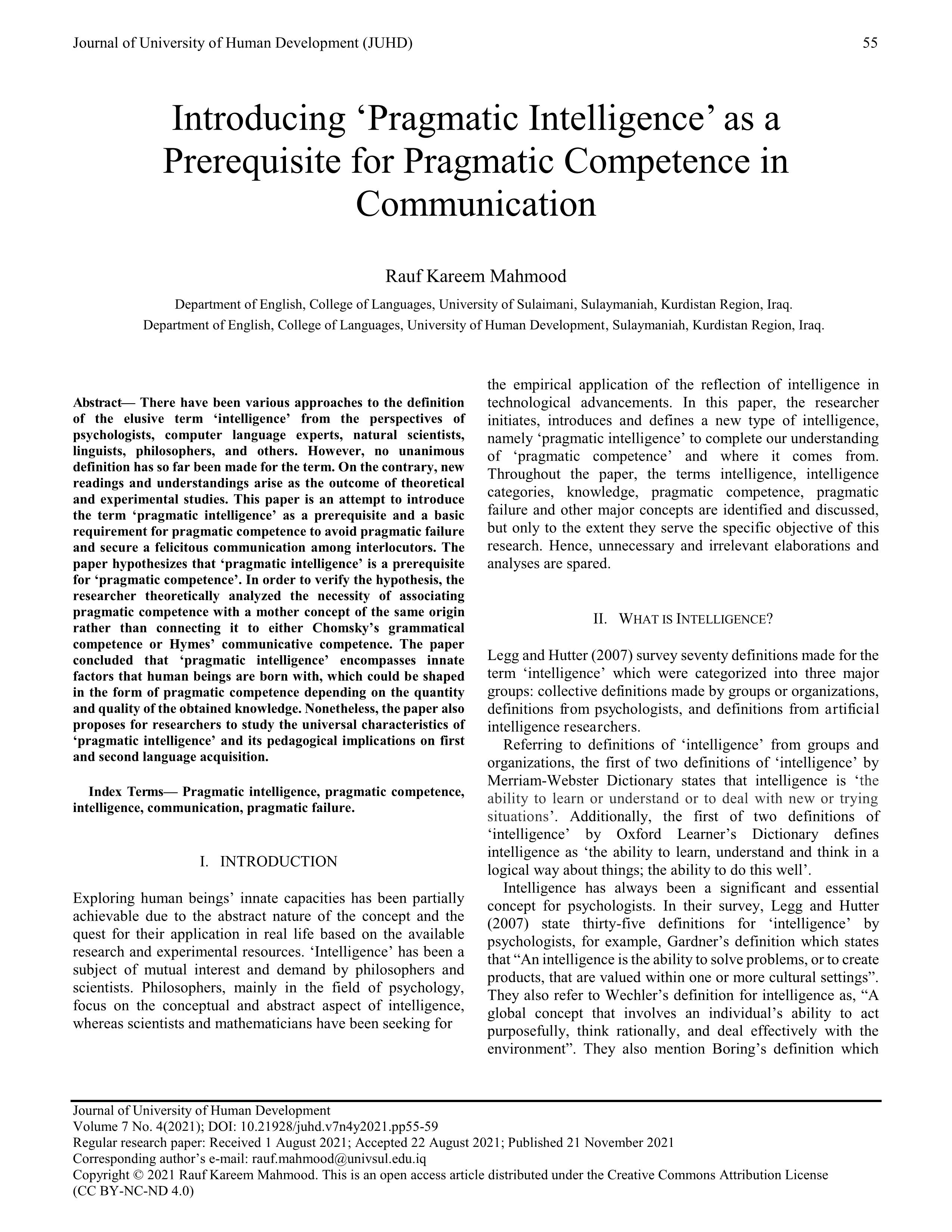Introducing ‘Pragmatic Intelligence’ as a Prerequisite for Pragmatic Competence in Communication
DOI:
https://doi.org/10.21928/juhd.v7n4y2021.pp55-59Keywords:
Pragmatic intelligence, pragmatic competence, intelligence, communication, pragmatic failureAbstract
There have been various approaches to the definition of the elusive term ‘intelligence’ from the perspectives of psychologists, computer language experts, natural scientists, linguists, philosophers, and others. However, no unanimous definition has so far been made for the term. On the contrary, new readings and understandings arise as the outcome of theoretical and experimental studies. This paper is an attempt to introduce the term ‘pragmatic intelligence’ as a prerequisite and a basic requirement for pragmatic competence to avoid pragmatic failure and secure a felicitous communication among interlocutors. The paper hypothesizes that ‘pragmatic intelligence’ is a prerequisite for ‘pragmatic competence’. In order to verify the hypothesis, the researcher theoretically analyzed the necessity of associating pragmatic competence with a mother concept of the same origin rather than connecting it to either Chomsky’s grammatical competence or Hymes’ communicative competence. The paper concluded that ‘pragmatic intelligence’ encompasses innate factors that human beings are born with, which could be shaped in the form of pragmatic competence depending on the quantity and quality of the obtained knowledge. Nonetheless, the paper also proposes for researchers to study the universal characteristics of ‘pragmatic intelligence’ and its pedagogical implications on first and second language acquisition
References
Birner, Betty. (2013). Introduction to Pragmatics. UK, Colchester: Wiley-Blackwell.
Bolisani, E., and Bratianu, C. (2018). The Elusive Definition of Knowledge. Emergent knowledge strategies: Strategic thinking in knowledge management. Cham: Springer International Publishing.
Chapman, Siobhan. (2011). Pragmatics. London: Palgrave Macmillan.
Chomsky, Noam. (2005). Rules and Representations. New York: ,Columbia University Press.
Cook, Vivian and Newson, Mark. (2007). Chomsky’s Universal Grammar: An Introduction (3rd Ed.). Blackwell Publishing Ltd. New Jersey.
Gardner, Howard. (2011). Frames of Mind: The Theory of Multiple Intelligences. New York: Basic Books.
Goleman, Daniel. (2009). Emotional Intelligence: Why it can matter more than IQ? London: Bloomsbury Publishing.
Ifantidou, Elly. (2014). Pragmatic Competence and Relevance. Amsterdam, John Benjamins Publishing Company.
Leech, Geoffrey. (2014). The Pragmatics of Politeness. Oxford, Oxford University Press.
Legg, Shane and Hutter, Marcus. (2007). A Collection of Definitions of Intelligence.
Mahmood, Rauf. (2015). ‘A Pragmatic Analysis of Imference as a Collective Term for Implicature and Inference’ International Journal on Studies in English Language and Literature (IJSELL). Vol. 3, Issue 9.
Russell, Stuart and Norvig, Peter. (2016). Artificial Intelligence: A Modern Approach (3rd Ed). Boston: Pearson Education Ltd.
Shen, Qi-yuan. (2013) ‘The Contributing Factors of Pragmatic Failure in China’s ELT Classrooms’. English Language Teaching: Vol. 6, No. 6 (published by Canadian Center of Science and Education)
Taguchi, Naoko. (2009). Pragmatic Competence. Ed. Berlin, Mouton de Gruyter.
Verschueren, Jef. (1999). Understanding Pragmatics.
Watson, Edward J. (2016). Emotional Intelligence.
https://www.merriam-webster.com/dictionary/intelligence
https://www.oxfordlearnersdictionaries.com/definition/english/intelligence?q=intelligence
https://www.linkedin.com/pulse/intelligence-vs-competence-explore-our-global-opportunities-/

Downloads
Published
How to Cite
Issue
Section
License
Copyright (c) 2021 Rauf Kareem Mahmood

This work is licensed under a Creative Commons Attribution-NonCommercial-NoDerivatives 4.0 International License.


